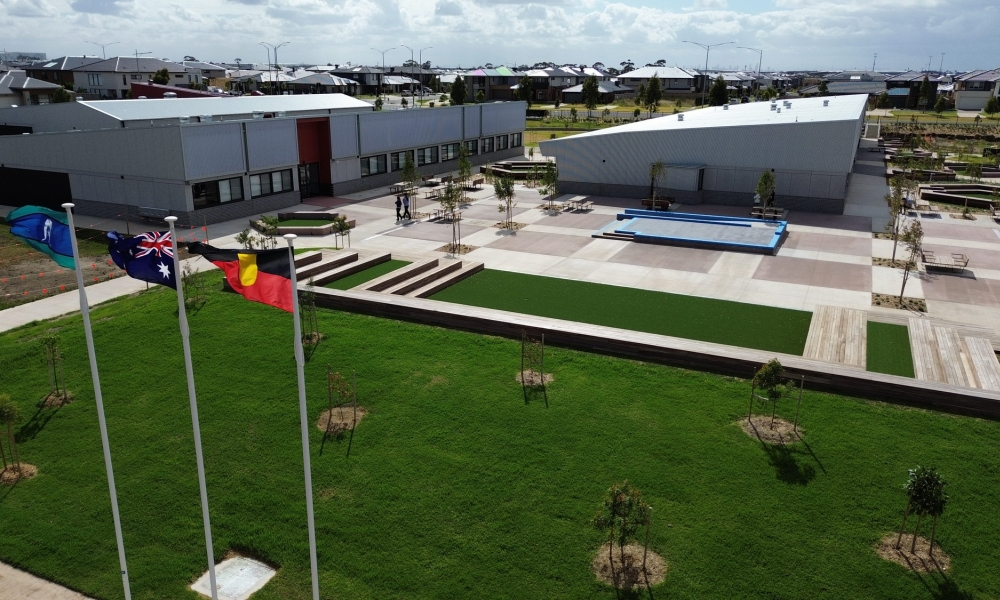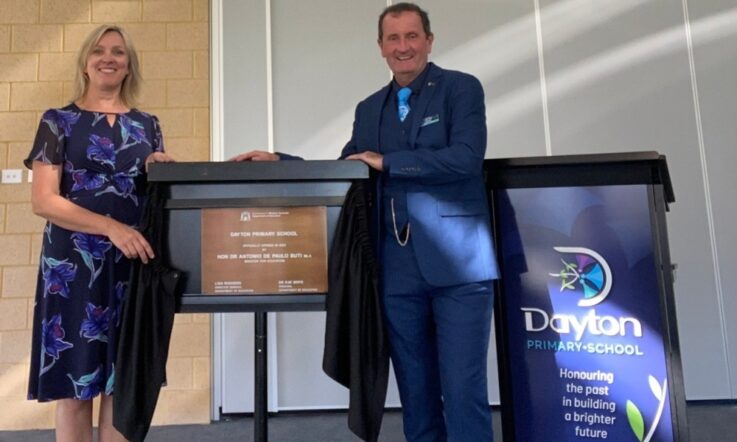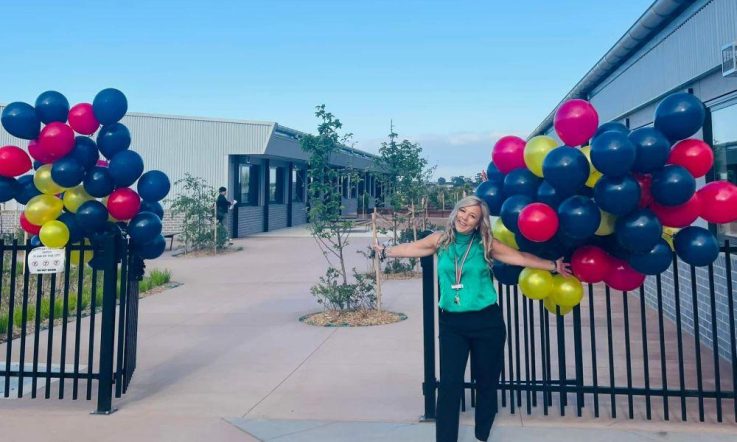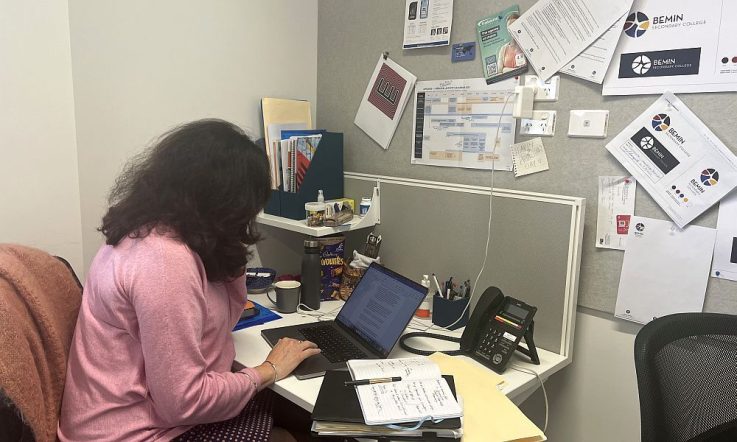This podcast from Teacher is supported by Teachers Mutual Bank, the only Australian bank built and owned by teachers.
Hello and thanks for downloading this podcast from Teacher – I’m Jo Earp. Welcome to Episode 11 of the School Assembly podcast series, and that’s the one where we explore what it takes to build a school from the ground up. So, in Series 2 we’ve been following Jo Camozzato and team out there at the dual campus Bemin Secondary College, in the Melbourne suburb of Truganina. Now, we’re on Episode 11, which means it’s actually the series final – so it’s a bit of a recap and reflection time. I’ll be speaking to Jo about the whole podcast experience and how she’s found that, about her expectations going into the role and then what the reality has been like. There’ll be the usual key learning, challenge and achievement, and some advice for fellow foundation principals from somebody who’s been through it twice now, actually. And also, we’ll be speaking to Jo about what her aims are and hopes for the next 12 months at Bemin. I hope you enjoy the episode.
Jo Earp: Hi Jo, good to speak to you again and we’ve actually reached it! It’s the last episode of the series. Which is sad, but it's going to be a good episode, so I’m looking forward to that. I'm interested what you've found useful, I guess (useful?) about the whole podcast experience.
Jo Camozzato: Yes, hi Jo. Look, it has been useful. It's given me an opportunity to reflect, literally once a month, over the course of the year on different things that have been happening, I suppose from opening the school until now. And I've also, sometimes I've thought about the questions that you might ask me, other times in the rush of my day and what's been going on, it's been a lot more spontaneous.
So I do apologise to people who have been listening when I butcher the English language; I tend to be a lot more informal in this podcast than what I'd be if I was presenting to people. But I suppose for me it's given me an opportunity, I hope, to come across and represent the life of what goes on in a new school, in an authentic way. I usually only listen back once and sometimes people make a comment about some things that I've said, and I go, ‘Yeah, I did say that.’ Then I might listen to just check what I actually said. But it has been good. It has been good as a form of reflection and, you know, you learn from reflecting and that's important to remember that.
JE: Hmm, hopefully it's been a pleasurable experience, it certainly has from our side of things. It has been a completely different experience as well from Series 1 where we followed Ray and Rachel in WA. I know this is quite a tricky question, because it’s hard to go back … but can you sort of cast your mind back to when you first got the role, and maybe what your expectations and your anxieties were at the time and then what the reality has been compared to that?
JC: Yes. Look, I'm going to reveal something on this episode. When I was first offered the position – and I went through the whole process, you know, writing the application, I was lucky to be shortlisted or my application was good enough for that and I was interviewed – when I was actually offered the position, I nearly turned it down. And I nearly turned it down because I needed a moment to think about it because the enormity of the job, of opening across 2 campuses, really kind of hit me and I actually thought even though I've been a foundation principal before and I worked with another excellent foundation principal previously as an assistant principal, can I actually do it again? So, then I pulled myself together and I accepted the role.
But, yeah, I nearly turned it down because I was concerned and those anxieties were real at the time, and were at the beginning of this podcast, that logistically, how would I manage? How would I actually get 2 sites to open at the one time? How do we get the administration working at the one time? Teachers? But you know essentially that's come about really well and it has been I think because my business manager has also been a business manager of a new school, and in the end that doesn't seem so hard now.
It is a challenge to juggle everything and certainly some of my middle leaders who work across campus are finding it hard to provide equal time to people. So, I think that moving forward that's always going to be something we find a little bit hard until we get big enough where there are different roles on different campuses.
Recruitment was my biggest worry as well as you remember, and that's like I said, never going away, I've said that in quite a few episodes. But, in the end, we got there as well, so I sort of like staggered it. Every time you interviewed me, I said, ‘oh, we only need 8 more’ and then it was like ‘now I need 15’ and ‘now I need 18’. But we seem to have got there both from the administration point of view and the wellbeing team, as well as the teachers.
And I was worried about the students merging from different prep to 9 schools at year 10. Not so much the year 7s, I felt that they were in a more logical or traditional, I suppose trajectory from year 6 into year 7 and that has gone really smoothly. But I was really worried about how these 15-year-olds all come together in this one school at a very interesting time of their personal development. And look, there was some challenges in term 1, no doubt about it, but credit to the kids. You know, over a period of weeks, they've adopted our learning routines, our expectations very quickly. So, I kind of like think, ‘all right, if we can do it once, we can do it again next year’, but we know a bit more what to expect.
JE: Oh, that’s really interesting because I don't think we've ever discussed on one of these episodes about, you know, the role of the students – which is weird when you think about it. I mean, we talk about them in terms of being part of the learning community, expectations, their involvement in different things, but yeah, you're right – credit to the students. Because it's hard, isn't it? It's hard going into a new school, and any school I guess, but especially one that’s getting started. So, yeah, that’s a great point. Okay then, so we did our first episode back in August 2023, which is nearly a year ago. And in that first episode you were saying to me about how it's really important through all of it to stay flexible; lots of things popping up all the time. That's still good advice, right?
JC: Yeah, look, I think flexibility and I'm going to add sense of humour, are probably 2 of the biggest things you need in setting up a new school. Well, anyway, as a principal class member. But, you know, you can have a little bit of fun, you've got to be professional (professional fun – I'm not sure what they actually looks like, but professional fun) and I would also add there are times where you have to be quite firm and hold your stance. Because you are trying to set up a school that's for the community and you do want the best for everyone, and … you’ve got to pick your battles, that's probably the other bit of advice with that flexibility. There are times when you have to pick your battles with people that are helping to build the school, people helping with other infrastructure, but also with new staff. Like you might have an idea, idea sounds great, but it's not actually translating in reality once the school opens, and you have to have that flexibility again as a principal to go, ‘is that worth worrying about right now?’ Like, ‘it sounded great, but, you know, right now I've got other things to worry about and the staff are doing a really great job in other areas, so let's not worry about that’.
And I can give you a really simple example – very, very basic – because like I said, I always try to be authentic and down to earth in this podcast. I had this great vision that every home group class would have a bookcase with reading books on it and pot plants and things that the kids can grab in their classrooms. A lot like that wonderful thing you see in primary schools. Now at year 7, we’ve managed, that’s going really well. The year 7s and the teachers who work predominantly in those classrooms have set up spaces that are really atmospheric. So, it's very much like a home group or check and connect room – a place where you belong, where you have a lot of your classes. The bookcases are being used, other sort of things I've put in there are being used and they're really decorating the spaces. At year 10? Yeah, no that's not really working. So, the bookcases have not been used and you know it doesn't mean that we won't in the future, and that's okay; I can let that go, I can let that go. We can move bookcases out, we can put them in staffrooms, we can leave them there. But I'm not going to worry about it too much. And it's a simple example, but it's just an example of where I had an idea and other people agreed with me and we went to schools that were doing similar things, but for whatever reason, it hasn't translated across into my senior school campus, and I'm not going to unpack why? I know I've got a few ideas why, but that's okay.
JE: Yeah, it's okay, isn't it? In the big scheme of things, like you said. The other thing that struck me looking back on when we first chatted and those early episodes, the building side of things – with it being a dual campus as well – the building side of things was really kind of centre stage at the beginning, for quite a long time and that seems like ages ago. But that went really smoothly, didn't it? Or if it [didn’t] you did a good job of not letting on.
JC: Look, I would say yes, the whole building process went pretty smoothly, and I think at a very high level, like 90% to 94%, 95% of things that were built are a really good fit for the students. Now we're in that situation where you move in and like when you build your own house, you move in and you realise ‘maybe I should have put the pantry door in a different place’, or ‘actually the new fridge doesn't actually fit there, and that's my problem, I didn't measure that properly’ or ‘someone didn't realise that I was left-handed.’ So, there are things like that happening across our 2 campuses, mainly around doors and locks and things like that, but they can be fixed.
Overall, I think the building went really well across the 2 sites. There are some bits missing. the Junior School campus, there’s a shared oval on the corner that wasn't developed yet … that may or may not happen in the future. Senior school, we're missing 3 buildings, so we do need that for Stage 2 when we get bigger and bigger, but Stage 1 is built, and we have to feel grateful for that. I don't like to complain, and the reason why [is] there are many schools that have old facilities, need refurbished facilities, and you always have to remember when you're in a brand-new built school that it is a privilege, no matter if you've got bits missing or things aren't perfect.
Just like there’s more to teachers than teaching, there’s more to banks than just banking. At Teachers Mutual Bank, they reinvest profits to benefit members, through online resources, offering scholarships and building partnerships that reward teachers just like you. They know that teachers need a different kind of bank. Visit tmbank.com.au. Membership criteria apply. Teachers Mutual Bank Limited AFSL238981.
JE: So, with it being the final episode then, I’m going to have a little bit of a switch around to our usual thing because I want to end on a couple of other things – so we're going to do the key learning, challenge and achievement at this point. So, key learning for this month, let’s start with that.
JC: Yeah, so the key learning is I went to one of those Wyndham Principal Network meetings only the other week – which I've spoken about that before – and there was a presentation on the Victorian Academy of Teaching and Leadership new Leadership Excellence Framework. So it's really for leaders. And I really enjoyed that presentation because as they were unpacking what they consider to be leadership dispositions and capabilities and domains, we did an exercise and focused on solving complex problems and that to be, you know, a leader in a school, and definitely a principal, you have to be able to solve complex problems and that some problems are technical and some are just complex.
And the reason I enjoyed that presentation and I obviously want to know more is that it's hard sometimes to explain what your day looks like and also what a new school looks like, or a school that's established, where as the principal you are solving really technically simple problems sometimes and other times really complex problems. And I really enjoyed that experience, that learning, if you like, because it's given me a shared language in a way of explaining to my own leaders how we go about things. You know, ‘that's a technical problem’ or ‘that's very complex and let’s unpack it as a complex problem’. So, that was my key learning for the month – that was exciting.
You know, I'm going to say challenge this time is rapid growth. So, you've caught me on a day where I've just been told we now have 279 year 10 students in our zone for next year who will be enrolled to come here. So that's doubling, more than doubling, the number of students on this campus; and we have 140 plus students going on to the Junior Campus next year. So that's really frightening. Not unexpected, but when you actually see the numbers, you just sort of think ‘oh my goodness’. Because, you know, guess what, we're nearly running out of classroom space on the Senior Campus; that's why we need another 3 buildings. And then of course attached to that I can't even think about where all the staff are going to come from. So that’s my challenge, rapid growth.
JE: Rapid growth – good luck with that one.
JC: Yeah. Yeah. And look, achievement – it’s sort of a comment on something traditional, and I sort of touched on it last week. Our year 10 students have finished their year 10 exams. Now, look, I'm not necessarily a lover of exams. I'm sure there are a lot of educators out there who think, wow, you know, 100 years on, we're still doing exams; but it's a way of us suppose assessing and it's here to stay for a bit longer and you're very conscious that if you don't set up exams under certain conditions, you could be disadvantaging your students as they move through the senior years. But I thought it was a massive achievement and a successful achievement for many of our students to come in everyday to sit the exam, to study for different subjects, en-masse. You know, they might have done it in smaller amounts, or smaller groupings in prep to 9s or not at all. So, some students had done exams, some had never experienced exams – which is normal from a year 9 point of view. But it was a really wonderful … I wouldn't say they enjoyed the experience, but it was great to see how they took it seriously. It was another whole pile of work, like I commented on last time, for our staff, and it went off really well. So, I think that was a massive achievement really.
JE: Hmm, that's a nice one. Moving towards the end of episode, then, and the series. I was interested in your advice to all the principals who are about to go on this same journey, I guess we call it. One of the things that sticks in my mind from the first episode, and we’ve spoken about it in another episode as well, was that you said it's like a drama production. There's a different narrative. And so, I know that every time's different, but I was wondering if there’s any advice for other foundation principals out there?
JC: Yeah, I think I'm going to say just that reminder that it's not your show. That you are the principal and you're appointed to make sure this happens, but you're creating it for the community, and I think you really need to always keep that in mind. It's like me saying just earlier then ‘I don't know if I really like exams’, but I know that we should do this for our students, so we don't disadvantage them. So, you might make decisions in your new school, you know, that really are not perhaps what you thought you'd be doing, but the reality is you're responding to the student needs in the community, and I think that's really important. It is not your show. You want to be able to, when you step away, to make sure it continues and it continues to flourish when you've done your job in a few years’ time, if that's how long it is that you're there.
But the other thing is, because you are the foundation principal, it's about building that rock solid foundation. And people can refurbish and change things and undo things. But I will also say, using my drama examples ‘you've got to be prepared to saw off the set’. So, now, what I mean by that is a long time ago I was stage managing and helping out with the school production and a different director had designed the set and I assumed that he had measured the proportions of the set, and he gave it to me, and I gave it to the maintenance crew at the school to build. And then when we were bumping in, well, guess what? The set was too tall, and we all stood there going ‘how are we going to do this?’ All the students are arriving.
The person who was higher up in the hierarchy than me, was the director, he was going to come along and the set didn't fit in. And I just went ‘saw it off. How many metres?’ And they said ‘…at least, you know, metre-and-a-half’, I said ‘saw it off … there's no point waiting. What are we waiting for? When everyone arrives, we'll be doing the same thing, which is we have to saw it off to stand it up.’
So, you do sometimes have to saw things off and just get on with it so that you can get on with the show. That's my advice. And it was a hectic moment, even on stage that day and quite entertaining and we had to deal with the fallout of bits of wood on the side of the stage. But hey, the audience didn't know, and it still looked good. So, saw off your set if you have to.
JE: You’ve got to saw off your set if you have to – just saw off your set! That could be the best bit of advice I think we've ever had on a podcast. I love having these chats with you, and I’m going to miss them! Okay then, I'm going to come back to you in 12 months (if that's still alright, if that's okay). Thank you very much, by the way, for letting us in on this whole thing for the last few months, because I know that there's probably times where you like ‘oh, do I have to speak to her again … the questions are getting increasingly longer and more complex’. But I'm going to come back to you in 12 months for an update. What are your aims and hopes for the next 12 months at Bemin Secondary College?
JC: Like I said, I did do my homework on this episode, so thanks for saying that, Jo. Sometimes I have just gone ‘I don't know what I'm saying today. Hopefully I'll get something out that's sensible and helpful for people who are listening.’ It's pretty simple – in 12 months’ time, really what I really would like is that the Truganina community are proud of their local college, which we’re their local secondary school, and they speak positively for most part about the setting for their children out in the community and that the kids want to come to school, and we have staff that enjoy working here. If that's what we can achieve, very simply, over the next 12 months, I'll be really happy with that. Because if the community feels it's a good school and we're doing our best here, then I think the students will get a lot out of coming here as well.
JE: That is a brilliant way to end. I'm going to leave you to it then, to just get on with it, and you won't have to worry about me … well, until I come knocking on your door in 12 months’ time if you let me in. So, I'd love to speak to you then and get an update. But thank you so much for this series. Best of luck to you and everyone, all the staff, the students, and of course the parents and the families and the whole community for the rest of the year, and I'll catch you in 2025.
That’s all for this episode and for this series of School Assembly. If you missed any of the other episodes in Series 2 just head on over to the Teacher archives and you can binge on those, and there’s also of course Series 1 to catch up on if you’ve not heard that. And if you want to do more listening of Teacher podcasts there are more than 300 in the archives. While you’re there please leave a rating and a review because, that would just be awesome, and it helps people like you to find the podcast, and it’s a great support for the Teacher team.
You've been listening to podcast from Teacher, supported by Teachers Mutual Bank, the only Australian bank built and owned by teachers.
Other episodes in this series:
- S2E1: New beginnings – meet the principal
- S2E2: All things planning
- S2E3: Recruitment in a time of teacher shortages
- S2E4: The mission, values and vision
- S2E5: The build
- S2E6: The big launch… and one year on
- S2E7: Establishing the instructional model
- S2E8: Meeting individual student needs
- S2E9: Linking the student learning journey
- S2E10: Staff collaboration and feedback



